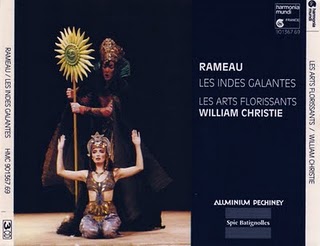Jean-Philippe Rameau - Les Indes Galantes (1992)
Jean-Philippe Rameau - Les Indes Galantes (1992)

1. Prologue
2. 1re entrée : le Turc généreux
3. 2e entrée : les Incas du Pérou
4. 3e entrée : les Fleurs, fête persane
5. 4e entrée : les Sauvages
Claron McFadden - Hébé, Zima
Sandrine Piau - Zaüre
Isabelle Poulenard - L'Amour, Phani
Noémi Rime - Fatime
Miriam Ruggeri - Émilie
Howard Crook - Valère, Damon
Jean-Paul Fouchécourt - Don Carlos, Tacmas
Jérôme Corréas - Bellone, Ali
Bernard Delétre - Hauascar, Don Alvar
Nicolas Revenq - Osman, Adario
Les Arts Florissants
William Christie
Les Indes Galantes (The Gallant Indians) was Rameau's second theatrical work. Termed an opéra-ballet, it was essentially a dance spectacle with sung elements. (The form was descended from the earlier ballet a entrées of the French court.) There was more than one kind of opéra-ballet; the more dramatic works were termed ballets heroïques, and Les Indes Galantes was one of these. It was first given on August 23, 1735, to reviews that both praised and condemned it. Much of the music was quite adventuresome and elicited strong reactions from the Parisian public. The libretto was by Louis Fuzelier, a writer of comedies and a well-known author. The Prologue has a theme taken from mythology, and concerns the universality of Love. Each section or entrée is set in an exotic locale and contains a story of an amorous nature.
The exotic locations, while typical of the genre, here point vaguely toward Enlightenment-oriented human universals. Nevertheless, there is plenty of pure spectacle. Le Turc Genereux (The Generous Turk) contains a descriptive storm scene, a chorus of sailors, and a ballet by African slaves. The storm music is quite effective, and makes use of Vivaldi-like tremolos and scalar patterns, as well as dramatic key changes.
The Incas' Festival of the Sun is depicted in the second entrée in a grand spectacle full of choruses, symphonies, and airs. There is a long scene in which the sun is invoked by the priest Huascar, and the chorus "Brillant Soleil" (Brilliant Sun) is its climax. Although this scene was praised by Voltaire, many found it too new and unusual. The earthquake that follows is described in the orchestra by tremolos, rushing scales, and dissonant harmony, and was considered too difficult to perform. An unusual trio for Phani, Don Carlos, and Huascar is another highlight of this entrée; Huascar's voice argues in counterpoint with the two lovers, right before he is vanquished by the eruption of a volcano. The music of this entrée is very dissonant, emotionally sustained, and quite modern.
Les Indes Galantes contained only the first two entrées and the Prologue at its premiere. Afterwards, Rameau added Les Fleurs, which offers emotional release after so much drama. The dominant element in this entrée is the dance; there is no drama, only serene music. The final Les Sauvages (The Savages) was added at a much later date. Set in a North American forest, with Native American characters, after an initial amorous story, the main body of the entrée is built around the Ceremony of the Pipe of Peace. Much of the music for the ceremony was taken from harpsichord music Rameau had published in 1730, and the entree ends with a chaconne written for the opera Samson. ---Rita Laurance, Rovi
download: uploaded yandex 4shared mediafire solidfiles mega filecloudio nornar anonfiles
Last Updated (Monday, 31 March 2014 18:53)








